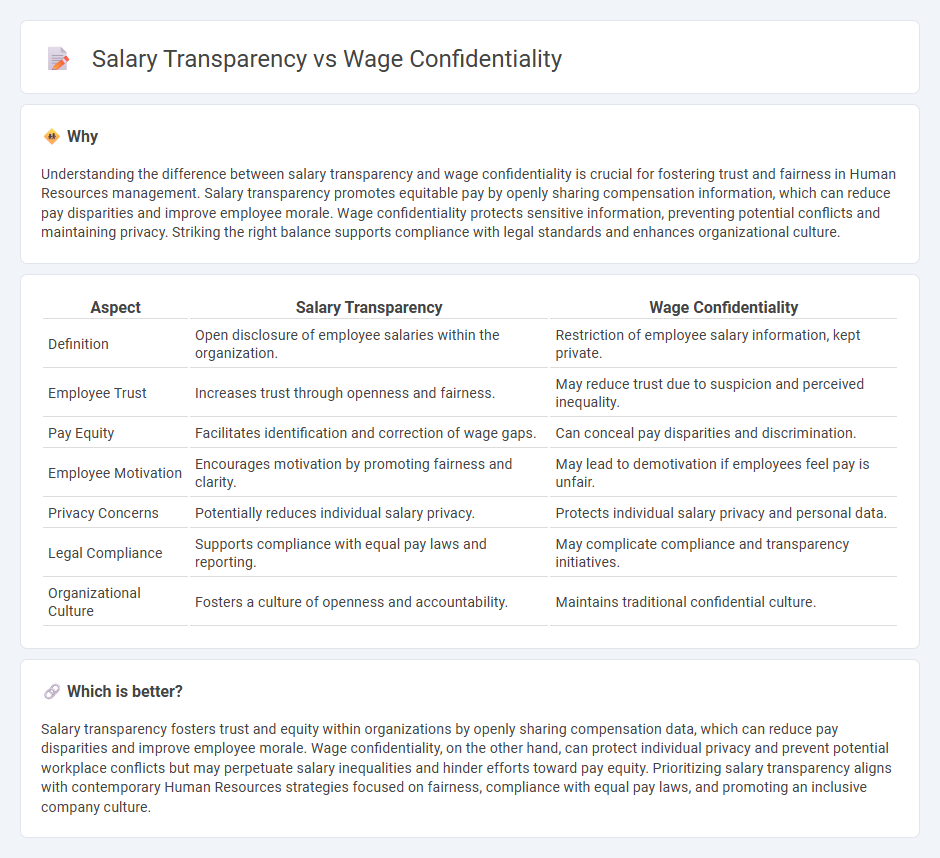
Salary transparency promotes equitable pay and employee trust by openly sharing compensation information within an organization. Wage confidentiality, on the other hand, protects privacy and can prevent workplace conflicts but may perpetuate pay disparities. Explore the impacts and best practices of both approaches to optimize your human resources strategy.
Why it is important
Understanding the difference between salary transparency and wage confidentiality is crucial for fostering trust and fairness in Human Resources management. Salary transparency promotes equitable pay by openly sharing compensation information, which can reduce pay disparities and improve employee morale. Wage confidentiality protects sensitive information, preventing potential conflicts and maintaining privacy. Striking the right balance supports compliance with legal standards and enhances organizational culture.
Comparison Table
| Aspect | Salary Transparency | Wage Confidentiality |
|---|---|---|
| Definition | Open disclosure of employee salaries within the organization. | Restriction of employee salary information, kept private. |
| Employee Trust | Increases trust through openness and fairness. | May reduce trust due to suspicion and perceived inequality. |
| Pay Equity | Facilitates identification and correction of wage gaps. | Can conceal pay disparities and discrimination. |
| Employee Motivation | Encourages motivation by promoting fairness and clarity. | May lead to demotivation if employees feel pay is unfair. |
| Privacy Concerns | Potentially reduces individual salary privacy. | Protects individual salary privacy and personal data. |
| Legal Compliance | Supports compliance with equal pay laws and reporting. | May complicate compliance and transparency initiatives. |
| Organizational Culture | Fosters a culture of openness and accountability. | Maintains traditional confidential culture. |
Which is better?
Salary transparency fosters trust and equity within organizations by openly sharing compensation data, which can reduce pay disparities and improve employee morale. Wage confidentiality, on the other hand, can protect individual privacy and prevent potential workplace conflicts but may perpetuate salary inequalities and hinder efforts toward pay equity. Prioritizing salary transparency aligns with contemporary Human Resources strategies focused on fairness, compliance with equal pay laws, and promoting an inclusive company culture.
Connection
Salary transparency enhances trust and equity within organizations by openly sharing compensation data, which contrasts with wage confidentiality that keeps employee earnings private to prevent workplace conflicts. Both practices influence workplace culture, employee motivation, and retention strategies by shaping perceptions of fairness and privacy. Understanding the balance between salary transparency and wage confidentiality is crucial for HR professionals in designing compensation policies that foster inclusivity and compliance with legal standards.
Key Terms
Pay Equity
Wage confidentiality often conceals disparities that perpetuate pay inequity, limiting employees' ability to advocate for fair compensation based on market standards and performance metrics. Salary transparency fosters a culture of openness, enabling organizations to identify and address unjustified pay gaps influenced by gender, race, or other biases. Explore how implementing transparent pay policies can advance pay equity and enhance organizational trust.
Compensation Policy
Wage confidentiality policies restrict employees from discussing their pay, potentially leading to wage gaps and reduced trust within the workplace. Salary transparency promotes fairness and equity by openly sharing compensation information, which can enhance employee satisfaction and retention. Explore our detailed guide to understand how effective compensation policies balance confidentiality and transparency for organizational success.
Disclosure Practices
Wage confidentiality policies restrict employees from sharing salary information, often hindering workplace transparency and perpetuating pay inequalities. In contrast, salary transparency promotes open disclosure practices that enable fair compensation, reduce wage gaps, and foster trust among employees. Explore detailed insights on how disclosure practices impact organizational culture and employee satisfaction.
Source and External Links
Pay Secrecy: Can You Tell Employees To Keep Their ... - In Australia, pay secrecy clauses are banned as of 2025, and employees have the right to openly discuss their remuneration.
Pay Secrecy Policies: Are You Breaking the Law? - In the U.S., the National Labor Relations Act (NLRA) protects both union and non-union employees' rights to discuss their wages, and employers cannot legally punish employees for such discussions.
Know Your Pay Transparency Laws - While federal law (NLRA) prohibits employers from stopping pay discussions, some U.S. states have additional pay transparency laws requiring employers to disclose compensation information.
 dowidth.com
dowidth.com